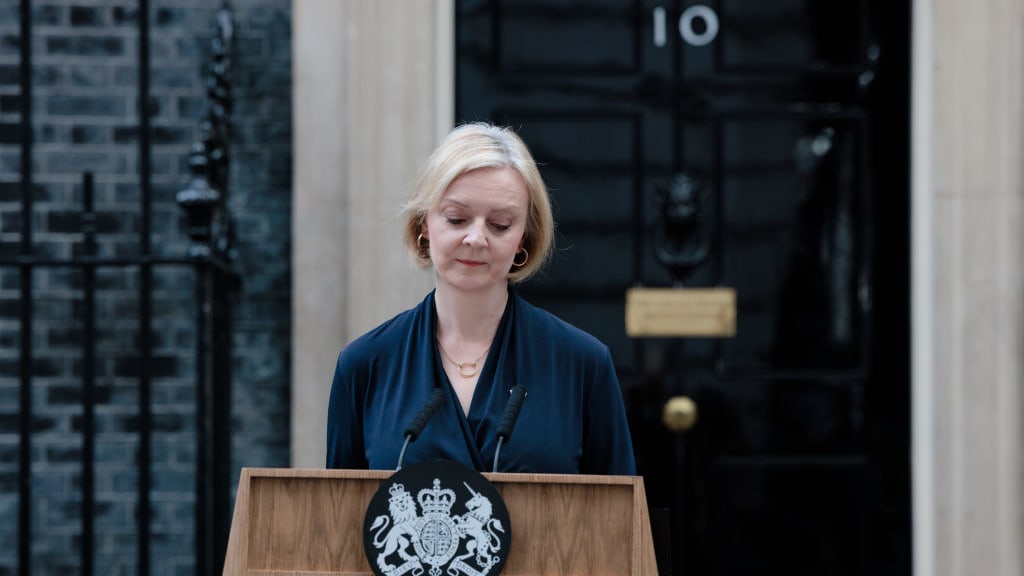It’s official—Liz Truss had the shortest tenure of any prime minister in British history. Just 44 days after arriving at No.10, Truss’ regime was officially killed off on Thursday along with the United Kingdom’s ability to pretend any longer that it hasn’t fallen into absolute kakistocracy.
The under-fire PM had a lackey wheel the notorious lectern of doom out into Downing Street as Britain was taking its lunch break to accept the inevitable.
“Given the situation,” she said, “I cannot deliver the mandate on which I was elected by the Conservative party.”
The Prime Minister said she had already informed King Charles that she was stepping down next week—giving her party time to hold a rushed leadership race.
However that plays out, Britain will now be treated to its third prime minister this year. Unless Boris Johnson returns which—incredibly—is now being reported as a possibility. Allies of the former leader said Thursday that they expect him to put himself forward as a candidate in the leadership race. If successful, he would be only the second Conservative prime minister in British history to return to power after being removed. The first was Johnson’s hero—Winston Churchill.
Truss’ disastrous reign was fittingly born of another disaster. Her predecessor Johnson—who attracted scandal the way a dead thing attracts flies—was finally brought down in July over his role in a colleague’s sexual misconduct. With rampant inflation creating a brutal “cost of living crisis” in the U.K., in which rocketing food and energy prices are pushing huge numbers of people into hunger and darkness, Britain was crying out for a serious replacement to Boris’ buffoonery to navigate such serious times.
But due to the Conservative party’s curious arrangements for choosing a new leader, around 170,000 grassroots party members were entrusted with choosing the new prime minister for the U.K.’s 70 million people for the third time in six years. Tory lawmakers whittled down the field of possible candidates to two—Johnson’s former finance minister Rishi Sunak and his foreign minister, Liz Truss.
A free market ideologue, Truss promised party members that she would radically slash taxes and put Britain on a path of rampant economic growth. Suank said such unfunded cuts would cause “misery for millions.” “The lights on the economy are flashing red, and the root cause is inflation,” Sunak said during one televised leadership interview in August. “I’m worried that Liz Truss’s plans will make the situation worse.”
Although Tory lawmakers backed Sunak, party members had the deciding say. On Sept. 5, they installed Truss as the new party leader. “I will deliver a bold plan to cut taxes and grow our economy,” Truss said in her victory speech, deploying her favorite buzzword. She also said she would deliver “on the energy crisis” and, in 2024, she would “deliver a great victory for the Conservative party” at the next general election. The following day she met with Queen Elizabeth II so that the monarch could formally invite Truss to form a government, officially making her prime minister.
Just two days later, on Sept. 8, the queen died. With the British press and people completely focused on mourning the monarch, Truss enjoyed a lack of direct scrutiny in her first days in Downing Street that few if any prime ministers have been similarly afforded. She had the unusual opportunity to think carefully about her vision for the country, and how she would go about achieving it.
On Sept. 23, the British people got their first real taste of what was to come when Truss’ finance minister, Kwasi Kwarteng, unveiled his plan for growth. An ideological ally of Truss’, Kwarteng co-authored a book with Truss and others in 2012 titled Britannia Unchained which argued that high taxes and a bloated state were holding Britain back. Now in control of the nation’s finances, Kwarteng and Truss set about making their right-wing economic dream a reality. They announced the biggest tax cuts for 50 years, lifted the cap on bankers’ bonuses, and abolished the top rate of income tax. At the same time, they made the incredibly expensive promise to guarantee the price of household energy costs for two years.
The market response to Truss and Kwarteng’s economic plans was immediate and cataclysmic. The pound dropped to its lowest ever level against the dollar and government bond yields shot up by historic rises, creating a crisis in the mortgage market not seen since the financial crisis of 2008. Within three days, the turmoil had become so serious that the Bank of England was forced to take emergency action to stop what the central bank’s deputy governor called a “full-scale liquidation event” of pension funds triggered by Truss’ policies.
With the prime minister’s credibility in ruins, eye-popping opinion polls put her opposition Labour party ahead with unprecedented leads. Less than a month after Kwarteng delivered Truss’ economic vision, he was fired as finance minister on Oct. 14—a mere 38 days after he was appointed. Truss replaced him the same day with Jeremy Hunt who, on Oct. 17, announced that he was scrapping “almost all” of Truss’ economic plans in order to stabilize Britain’s finances.
With her already meager mandate destroyed, calls for Truss to resign grew louder and louder. On Wednesday, in the face of uproarious laughter and jeers in the House of Commons, Truss repeatedly insisted she was “a fighter, not a quitter.” But the blows kept coming.
The same day, her interior minister Suella Braverman was forced to resign. Downing Street insisted Braverman was shown the door because she used a personal email account to send an official document, thereby breaking ministerial rules. But local media reports suggested the real reason was because Braverman—who strongly backed a party manifesto commitment to reduce immigration—was at odds with an economy-boosting plan from Jeremy Hunt to scrap the immigration pledge altogether.
The chaos continued later on Wednesday evening in a vote around fracking. It was reported that Tory whips—who are responsible for maintaining party discipline—had resigned, only for Downing Street to issue a statement in the early hours to say they hadn’t. There was also confusion among Conservative lawmakers as to whether they would be punished if they didn’t side with the government in the vote. Alarming reports even emerged that some lawmakers were seen being physically pushed or bullied into voting a particular way, with the House of Commons Speaker announcing a formal investigation into the skirmish on Thursday. Calling the whole affair “inexcusable” and a “pitiful reflection” on the Tory party, veteran Conservative lawmaker Sir Charles Walker said “I think it’s a shambles and a disgrace,” adding that he’d “had enough of talentless people” in government.
Exactly who that will be—and whether they have any talent—remains to be seen. Jeremy Hunt, who has been seen as essentially running the government from 11 Downing Street since his appointment as finance minister six days ago, has already ruled himself out of the running.
According to The Times, Boris Johnson is expected to throw his hat in the ring just six weeks after he was removed from power. An unnamed source told the newspaper without a hint of irony that the disgraced Tory leader believes his candidacy is a matter of “national interest.” Some Tory lawmakers are said to be horrified at the prospect that Johnson could be back from the dead by Halloween.
“The British public deserve a proper say on the country’s future,” the Labour leader Sir Keir Starmer said in a statement. “We must have a chance at a fresh start. We need a general election—now.” The Scottish leader Nicola Sturgeon also demanded an election Thursday, describing the situation as “beyond hyperbole and parody.”
But for the moment, at least, it appears the Tories will try to install yet another prime minister without asking the British people if they want them or not.

